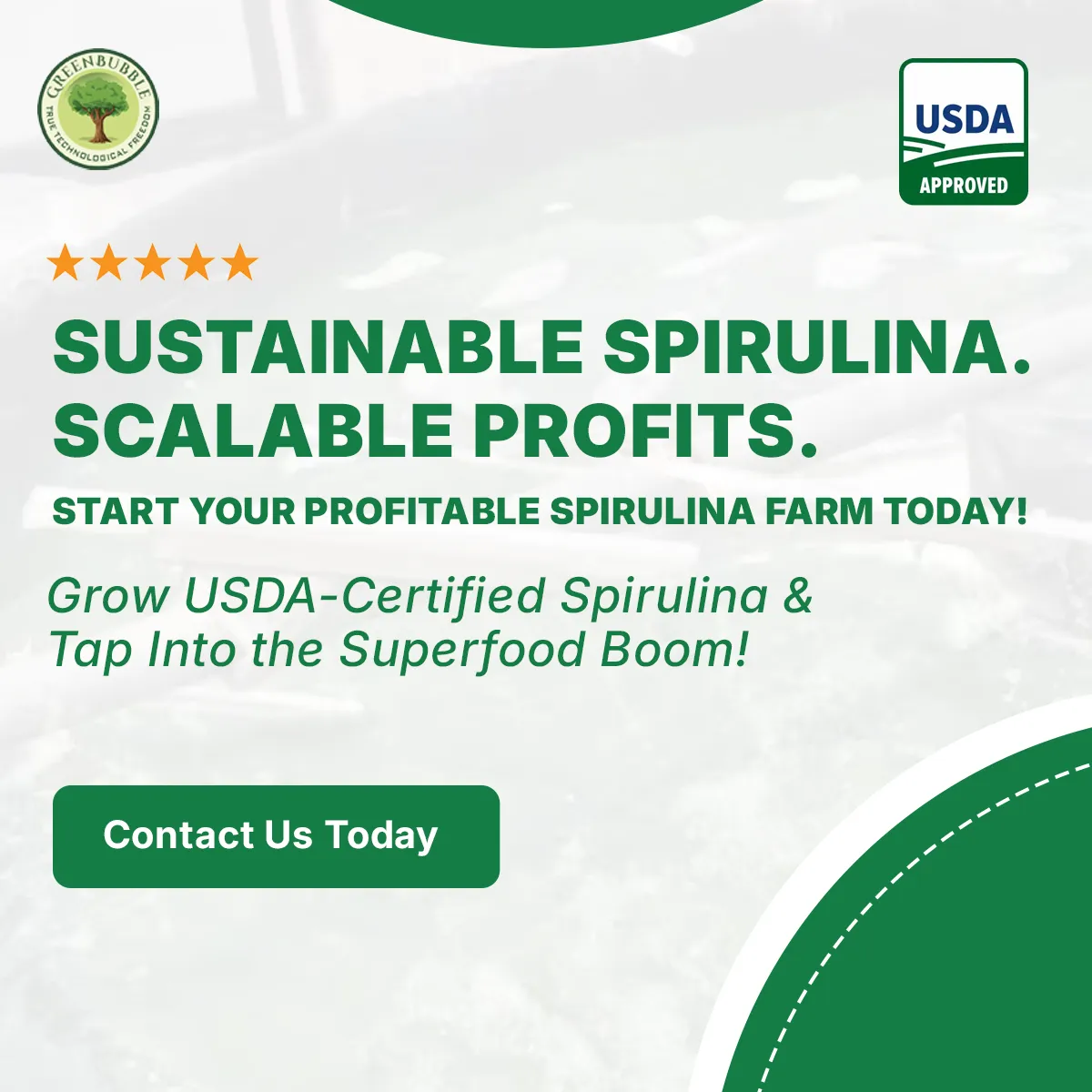Described as one of the best foods for the future”, Spirulina is now being viewed as a major nutrition source around the globe. This microalga or cyanobacterium contains a broad spectrum of nutrients, proteins, and antioxidants, making this organic substance ideal for many applications in different industries. The spirulina industry has rapidly expanded, with this superfood already in over 40 nations, most commonly for dietary supplementation purposes, however, the spirulina Industry keeps shifting to relaying messages to wider audiences and developing new formulations.
Below, we explore the current market applications of spirulina, as well as emerging trends and opportunities for commercial spirulina farming.
Commercial Spirulina Farming
Commercial spirulina farming is an immense market opportunity because of the rise in infernal concerns about health and well-being by averting people to natural sources of nutrition supplements. The spirulina market was evaluated at more than USD 542.52 million and will go up to approximately USD 1129.55 million by the year 2030 with a CAGR of 9.60%. This examines the market’s focus on spirulina’s traditional role as a dietary Help while considering its other potential related to marketing health schemes and innovative offerings. The industry has a forecasted growth from 393.6 million in 2019 to approximately 897.61 million by the year 2027 implying good growth prospects and thus new market participants and existing players will have many opportunities in the industry.
As the market grows there are chances in coming up with new products, new ways of farming as well as other uses such as in the cosmetics and pharmaceutical industries.
Exploring Various Spirulina Product Applications in the Market
- Colorants – Most industrial products now include spirulina because it enables them to provide a natural blue color. With the rising trend in switching to organic products, spirulina-based colorants are seen as the solution. It is incorporated in the food industry for blue-green coloring as well as in cosmetics and personal care products where natural color is desired.
- Food Industry – Spirulina is a common ingredient in functional foods as it is highly nutritious and can be added to numerous foods such as protein bars, and smoothies or even incorporated in snack and pasta production. As a superfood, there is significant demand for spirulina in the ever-growing wellness market as people want to consume food that provides additional benefits.
- Supplements – There are powder, tablet, and capsule forms of spirulina supplements that are widely available in the health and wellness market and are considered to be among the highest-selling products. They are acclaimed due to their high antioxidant activity, immune boosting, and as a good source of vitamins and minerals. The market for spirulina supplements is broad and ranges from bodybuilders to anyone who needs protein and vital nutrients of plant origin.
- Animal Feed – Spirulina finds application for use in livestock and pet food, especially for aquaculture purposes. Its rich protein content adds significantly to the animal feed’s nutritional value as well which supports the health and growth of the animals. As a feed additive, spirulina has proven to be beneficial to livestock and poultry by improving immunity, digestive health, and general well-being.
- Cosmetics – Spirulina expands to other industries including the cosmetics industry, as its anti-inflammatory and moisturizing properties have also been applied in skincare. Skincare products appreciate their natural antioxidants such as vitamins A and E. Thanks to its ability to enhance skin and reduce ruddiness, it quickly became cherished by both luxury and natural skincare brands.
- Fish Feed – Spirulina is now part of fish feed in the aquaculture industry due to its role in stimulating growth and increasing fish color. The carotenoids present in spirulina enhance the color of ornamental fish, and their nutritional benefits allow for a wide range of fish to be incorporated, which is optimal for this market sector.
Global Usage and Versatile Applications
Spirulina’s range of nutrients has seen its use in over 40 countries, most of which are in health-promoting products. Its use is not only limited to healthy nutrition but also in animal production for the health of farm animals and the cosmetic industry for skin product improvement. Spirulina’s benefits in weight loss, enhancing immunity, and improvement of health conditions have made it very useful in diabetes and malnutrition.
Opportunities in the Spirulina Market
The growth rate in spirulina farming is increasing because new applications are being discovered by researchers and companies. Here are some promising opportunities in spirulina farming:
- Exploring New Markets and Applications – So far, 18 new applications for the use of spirulina in the last year and new markets have been traced, thus emphasizing the widespread use of the algae. Developing technologies, new components, and formulations make it possible for spirulina to find opportunities from energy bars to new dietary supplements.
- Rising Usage in Animal Husbandry – Spirulina has begun to gain acceptance globally as the fourth green algae that can be used as a feed supplement. Its use for immune support and growth promotion has become an asset to livestock feed most especially in the poultry dairy and aquaculture industries. With more research supporting its usefulness, there is a steady increase in the demand for spirulina for animal husbandry.
- Growing Poultry Feed Supplement Industry – Locally in India Venky’s a poultry giant has commenced a pilot for spirulina additives in poultry feed. This indicates the increasing role of this supplement in the feed industries of poultry with improved health, enhanced egg production, and disease resistance. If these initiatives bear fruit, it would set a precedent for the increased use of spirulina for poultry commercial purposes globally.
- Sustainability and Organic Farming – Cultivating spirulina represents a more eco-friendly approach than traditional farming practices. Due to its low requirement for water and soil, spirulina can be grown in non-agricultural areas that are not suited for growing other crops. This aspect of sustainability makes spirulina farming an attractive investment in eco-friendly markets and opens niches for organic products.
Conclusion
As the world’s appetite for sustainable and nutrient-dense food is increasing, spirulina comes out as a special and optimal ingredient that can be used in a much wider scope. With regards to food, supplements, animal feed, and even cosmetics, the spirulina industry has plenty of growth opportunities, On the other hand, by understanding the trends of the market and implementing well-planned spirulina marketing strategies, the producers of these products can reach out to developing markets and efficiently increase their profits while fostering eco-friendly practices.
People who would like to enter or develop further in the spirulina industry can interact with experts like Greenbubble Spirulina Farming Solution who will help them establish large-scale spirulina farms and comply with the necessary regulations while opening to new markets. Carefully defined strategies and a good understanding of the industry would enable spirulina farmers to grow their businesses to satisfy the increasing global demand for this amazing superfood.


